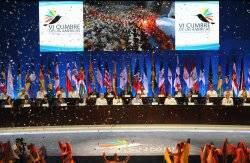A summit of nearly 30 Western Hemisphere leaders has ended without a joint declaration due to divisions over Cuba and Argentine claims to the Falkland Islands.
"There is no declaration because there is no consensus," said Juan Manuel Santos, the Colombian president, at the summit's closing news conference.
Washington, backed by Canada, stood fast against widespread demands to include in the meeting's final declaration language specifying that Cuba be present in future summits.
They had also balked at backing Argentina's claims to the British-held Falkland Islands, which prompted Argentine President Cristina Kirchner to storm out of the summit followed by Bolivia's Evo Morales.
"[Kirchner] was furious, we are told, because of the lack of full, complete support for Argentina's claim of control of the Falkand Islands," Al Jazeera's Lucia Newman, reporting from Cartagena, said.
"We understand she was very, very angry that [leaders] didn't even mention the dispute over the islands with the UK."
"She was overheard saying, 'This is pointless. Why did I even come here?'"
Latin America leftist leaders have been insistent that this weekend's meeting, which wrapped up at midday, will be the last regional summit under the auspices of the Organization of American States (OAS) unless Cuba is invited in the future.
"All the countries here in Latin American and the Caribbean want Cuba to be present. But the United States won't accept," President Evo Morales of Bolivia told reporters late on Saturday. "It's like a dictatorship."
Santos, however, said the leaders agreed to meet again in 2015 in Panama.
"Hopefully within three years we can have Cuba'' at the summit, he added.
US-Canada veto
US President Barack Obama's peers lectured him on Saturday over his unflagging opposition to Cuban participation due to US objections to the communist-governed Caribbean island's lack of democracy.
A senior US administration official, however, said in a briefing for White House reporters on Saturday evening that the subject did not come up in any of Obama's brief meetings on the summit's sidelines with the leaders of Guatemala, El Salvador, Argentina and Peru.
The foreign ministers of Venezuela, Argentina and Uruguay had said their presidents wouldn't sign any declaration unless the US and Canada removed their veto of future Cuban participation.
The Cuba issue led Rafael Correa, the Ecuadorean president, to boycott the summit. Daniel Ortega, Nicaragua's leftist president, also sat out the meeting, though he offered no explanation.
Venezuela's cancer-stricken president Hugo Chavez also was absent, as he was undergoing radiation therapy in Cuba.
Even moderates such as Santos of Colombia and Brazil's Dilma Rousseff said there should be no more America's summits without the communist island being represented.
The Obama administration has greatly eased family travel and remittances to Cuba, but has not dropped the half-century US embargo against the island.
'Americas' label
US commercial and political influence in the region has been in decline as China gains on the US as a top trading partner, and many analysts say these regional summits tend to be unwieldy and only make sense if they are a departure for serious follow-up on substantive issues.
"The label 'Americas' doesn't seem to mean that much anymore unless you're a cartographer," said analyst Adam Isacson of the Washington Office on Latin America.
The first Summit of the Americas was convened in Miami in 1994 by then-US President Bill Clinton. In subsequent summits, US attempts to create a hemispheric free-trade zone collapsed. South America's rising left further eroded US influence.
At this weekend's summit, Obama was criticized by some leaders for refusing to abandon a drug war that has claimed tens of thousands of lives and undermined governments, although he did not shy from listening to arguments on the other side.
Prostitution scandal
For some, the summit was overshadowed by an embarrassing scandal allegedly involving prostitutes and US Secret Service agents that widened when the US military said five service members staying at the same hotel might have also been involved in misconduct.
US legislator Peter King told The Associated Press after being briefed on the investigation that "close to" all 11 of the Secret Service agents who were put on leave on Saturday had taken women to their rooms at a hotel a few blocks from where Obama is staying. He said the women were "presumed to be prostitutes" but investigators were interviewing the agents.
Three waiters at the hotel told reporters that about a dozen US government workers they presumed were the Secret Service agents had spent a week drinking heavily.
One said he witnessed their apparent supervisor line them up and scold them on the hotel's back terrace on Thursday afternoon.
Immediately thereafter, the men packed their bags and left, said the waiter, who spoke on condition of anonymity because he feared he might lose his job.
PHOTO CAPTION
The Sixth Summit of the Americas formally opened under tight security in this Colombian Caribbean resort city with US President Barack Obama and most other democratically elected leaders of the Western Hemisphere in attendance.
Aljazeera


 Home
Home Discover Islam
Discover Islam Quran Recitations
Quran Recitations Lectures
Lectures
 Fatwa
Fatwa Articles
Articles Fiqh
Fiqh E-Books
E-Books Boys & Girls
Boys & Girls  Hajj Rulings
Hajj Rulings Hajj Fatwas
Hajj Fatwas














